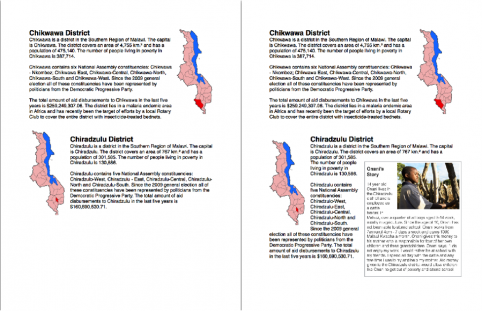Development professionals likely take into account a variety of information sources in order to make policy decisions. Some of this information is factual: statistics, maps, budget reports, or impact evaluations. Other information may be subjective: personal knowledge about individuals, anecdotal evidence, or media reports. A recent study by Dean Karlan and Daniel Wood found that individuals giving money to charities react differently to mixtures of qualitative and quantitative evidence on aid effectiveness depending on whether they are motivated primarily by altruism or by positive emotional feeling by helping others, called “warm glow.” How does this mix of quantitative and qualitative evidence impact the decisions one might make when allocating aid?

Screenshot of Malawi District profile with and without profile story added
Earlier this year, we highlighted preliminary results from a pilot study by AidData researchers at the College of William & Mary, Brigham Young University, NYU, and the University of Texas at Austin on how maps played a role in influencing aid allocation. In the randomized lab experiment, we asked 223 study participants to hypothetically allocate funds from a US$33 million aid project across 26 districts in Malawi. While there may be many criteria that figure into resource allocation decisions, for the purpose of this study we define “efficient aid allocation” as follows: the districts with larger absolute numbers of poor people and lower amounts of previous aid should get more new funding. Study participants were randomly assigned to receive solely factual information about the poor population and previous funding levels, or both emotional stories about residents in five randomly selected districts and the aforementioned facts, on which to base their allocation decisions.
We sought to determine whether study participants, when presented with stories in addition to factual information, would make different aid allocation decisions. The preliminary results appear to indicate that emotional stories may lead people allocate development resources less efficiently.

We found that a study participant’s exposure to emotional stories is associated with an inflated allocation of resources to the districts least in need of additional funding. In highly neglected districts -- that is, areas most in need based upon high absolute numbers of poor people and lower levels of aid -- participants that received both stories and facts did not allocate as much money as those that only received the facts. The opposite was true in low neglect districts, where stories appear to have prompted participants to allocate more money than their counterparts receiving only the facts.
The results of this pilot experiment represent a modest step forward in understanding how access to different types of information may influence how people make resource allocation decisions. Follow-up studies will explore questions of how to best represent sub-national data to facilitate efficient resource allocation decisions and how subjective information may impact these decisions. Ultimately, the most important step to take is to go beyond the laboratory and implement these types of experiments in the field with the local government and donor agency officials who actually make resource allocation decisions in practice.
For the formal write up of this study and further discussion of AidData research projects, check back on the First Tranche in the coming months.
